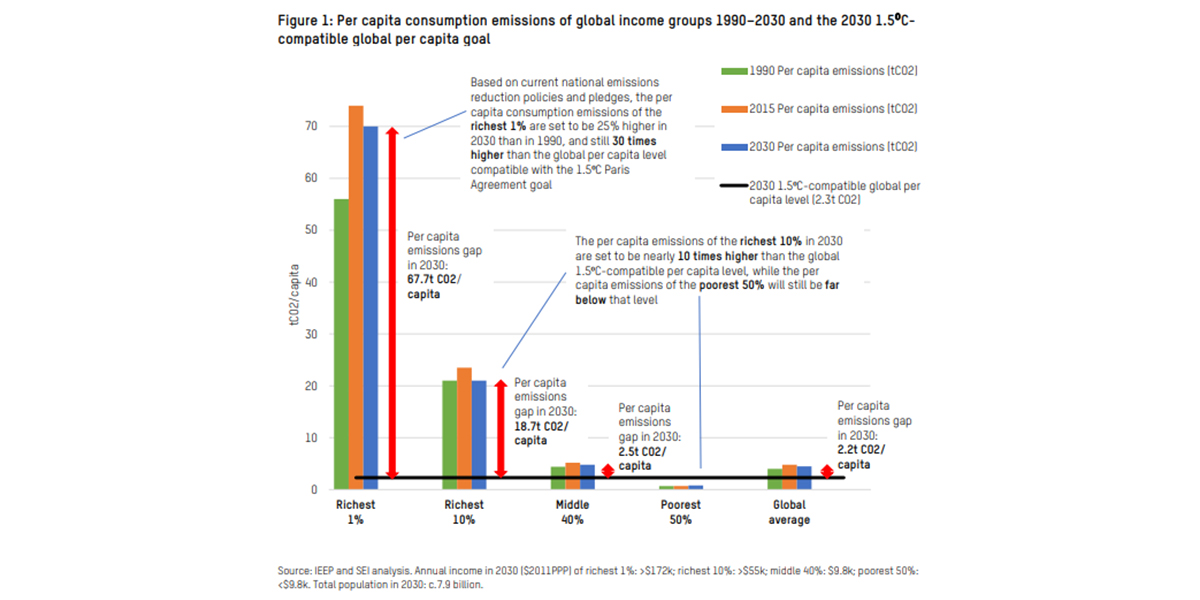- 4 min read
- Published: 20th March 2023
Oxfam reaction to the ‘IPCC’s Synthesis Report (SYR)’ – a blog on a mouthful of acronyms!

Oxfam Ireland’s Simon Murtagh responds to today’s publication of the Intergovernmental Panel on Climate Change’s (IPCC) Synthesis Report (SYR).
Today’s IPCC Report makes clear that this is literally the last chapter. The science shows that limiting global heating to 1.5°C is still possible - but only just. Unless we pull the emergency brake on deadly carbon pollution, ‘unheard-of’ heatwaves, storms, droughts and floods will continue to become more frequent and hit more places and people.
People living in poverty are bearing the brunt of these climate-induced crises, including mass hunger happening now in East Africa, with a rise of just 1.1°C.
There is vast inequality in our world and also in how much climate damage we do – the richest 1% of society create more emissions than the whole of the bottom half of humanity, and their share of global emissions is growing rapidly. So, we’re all in this together - but some of us have a much greater contribution to make.
To stay within the 1.5°C ‘guardrail’ that the IPCC urgently recommends, every person on earth would need to stay below an average of 2.2 tonnes of greenhouse gas emissions per year by 2030. The richest 1 percent use up this remaining ‘carbon budget’ in just 12 days each year, while the poorest 50 percent of humanity doesn’t even emit half of their carbon budget over an entire year. This inequality is absolutely ridiculous.
In Ireland, our climate strategy has been described as “kicking the can down the road”, and this IPCC report shows that our leaders are acting like much of the rest of the rich world - burying their head in the ‘business-as-usual’ of fossil fuel subsidies and a blind faith in mystical ‘technofixes’ that will save us from our fate - some day.
The outcome of this will be ‘overshoot’ – a scenario in which we have used up all our carbon budgets before their term, resulting in irreparable damage to people and planet. We are failing to live within our current national carbon budget in Ireland of 295 million tonnes (megatonnes, or mts) of greenhouse gases per year and we have already spent 23.5 per cent of the five-year budget before the 2022 figures have even emerged. We must resist this trend and frontload our climate and biodiversity actions now.
For more, the IPCC’s website is something I’d really recommend – their reports are really clear and beautifully illustrated with graphics and graphs.
Check it out here and, if we can link you to them and you can read the science for yourself, that’s one good job Oxfam Ireland has done today.
It’s outrageous that after six massive IPCC reports, 27 climate change conferences and the eight hottest years on record —with emissions still rising— governments continue to encourage the oil and gas industry to drill deeper and wider for fossil fuels. More than 600 fossil fuel lobbyists were at COP27 and an oil boss will lead the next climate talks in Dubai.
Oil giants raked in record profits in 2022. They are extracting these riches from a stricken planet. Their statements of ecological concern ring hollow. If governments had clawed back the massive profits that oil and gas producers funneled to their rich shareholders last year, they could have increased global investments in renewable energy by nearly one-third.
We can tackle the climate crisis and end poverty. This is not an either or. If the richest 1 percent stopped squandering so much carbon on private jets, big polluting cars and investments in fossil fuels, the poorest half of humanity could grow and flourish, and suffer fewer climate disasters, and look to the future with much greater confidence.
Notes to editors
According to the World Meteorological Organization (WMO), the past eight years were the warmest on record globally, fueled by ever-rising greenhouse gas concentrations and accumulated heat.
At least 363 fossil fuel lobbyists were granted access to COP27.
Big Oil more than doubled its profits in 2022 to $219 billion, more than the GDP of many countries. According to Janus Henderson Investors, the dividends of oil and gas producers totaled $151.8 billion in 2022. The IEA reports that $472 billion was invested in renewable power in 2022. (151.8/472)*100 equals 32.2 percent.
Oxfam’s research found that the investments of just 125 billionaires emit 393 million tons of CO2e each year —the equivalent of France— at an individual annual average that is a million times higher than someone in the bottom 90 percent of humanity.
According to the World Inequality Lab, eradicating global poverty below $5.50 would entail an increase in carbon emissions of approximately 18 percent. This is roughly equivalent to the emissions of the richest 1 percent (15 percent between 1990 and 2015).
